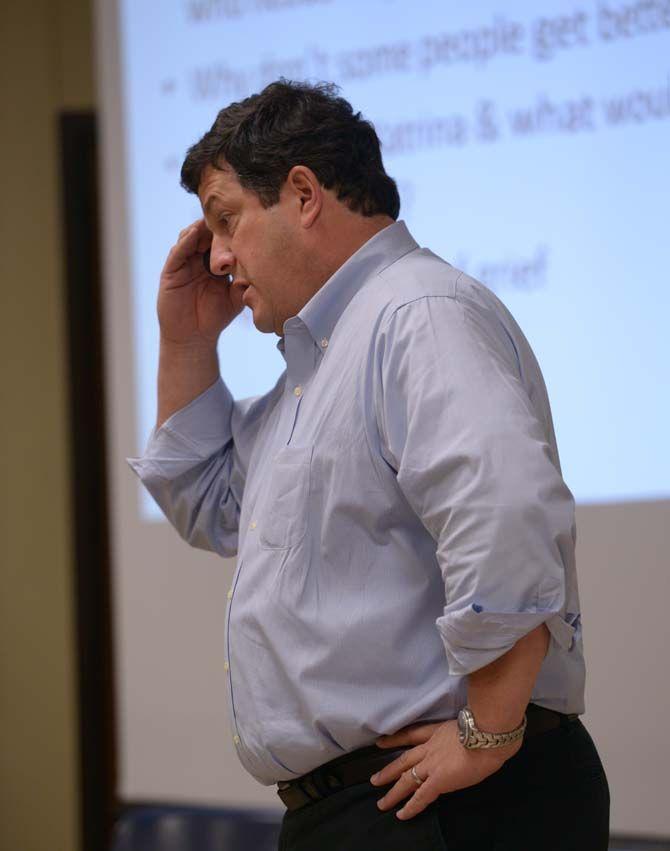From business professor to author, Nathan “Nate” Bennett of Georgia State University turned his grief into an eye-opening account of a widower’s journey in his book, “Shannon’s Gift.”
Bennett — former Associate Dean for Academic Programs at the E.J. Ourso College of Business — visited the University on Nov. 18 to speak to students in social work professor Pamela Monroe’s course, Families: Policy and Law, and present to the School of Social Work’s Book Club about his book and the experience of losing his wife, Shannon.
Book club attendees are practicing social workers who Nate said can gain insight into the grieving process through his book’s personal and chronological account. He was joined by guest panelists Rev. Michael Alello, Michael Rolfsen and social work adjunct faculty member and practicing social worker Sherry Smelley.
“Shannon’s Gift” is a retelling of the blog Nate kept following Shannon’s unexpected death due to complications from a routine surgical procedure.
“After I had been doing it for a while, I realized that there really hadn’t been much written about grieving by men,” Nate said. “Most of what’s written is by women, and I thought that maybe I had a unique opportunity to say what it’s like as a man to go through this grief process.”
Nate and Shannon met at a Greek mixer in 1982 while they were both students at Tulane University. A year later, they started working together at a restaurant in the French Quarter and began dating shortly after.
In high school, Shannon noticed her right eyelid begin to droop. Nate said she wasn’t concerned at the time because it never got better or worse.
Around the time of their marriage, Nate said Shannon finally decided to undergo testing to determine the source of the unusual symptom. A muscle biopsy confirmed she suffered from mitochondrial disease, an illness characterized by failure of the cells’ energy-producing mitochondria.
Nate said doctors told the couple Shannon’s condition would continue to worsen, but there was little to be done about the illness besides taking vitamins and maintaining a healthy lifestyle. Doctors were unable to estimate the rate of Shannon’s deterioration.
Despite the diagnosis, Nate said Shannon’s drooping eyelid was the only outward manifestation of her illness.
“For those 25 years, without us knowing it, Shannon’s body was getting worse all the time,” Nate said. “When she went to get her surgery, we had no idea how bad the situation was.”
At 48, Shannon underwent a routine surgery to treat a shoulder injury. After coming out of anesthesia, Shannon collapsed in the recovery room while Nate was pulling the car around to meet her at the front of the outpatient facility.
Nate said he was ushered into a waiting area until a doctor informed him they had lost his wife but were able to resuscitate her. However, given the progression of her mitochondrial disease, Nate said Shannon suffered severe brain damage, which ultimately proved fatal.
“When they brought me back to see her before they put her in the ambulance, I feel like I knew where this was going,” Nate said.
Shannon was rushed to the ICU, where she remained on artificial life support for 11 days before her family decided it was time to honor the wishes outlined in her living will and allow her to pass away.
Following Shannon’s collapse, family friends started a website through CaringBridge, a site dedicated to creating a community for health support, to keep connected and allow Nate to update people on her condition. When it became clear Shannon was unlikely to recover, Nate’s updates turned into a personal blog.
“I found the writing very cathartic and a really important part of how I grieved as my wife passed away and as we tried to move on,” Nate said.
Many recommended Nate try journaling as a method to express his grief, but he said he found it easier to express himself to an audience of anonymous readers. Nate continued to blog for a few years after Shannon passed away, and over time, his readership grew to include thousands of
supporters.
“The main thing that the writing did was it allowed me to be heard by other people,” Nate said. “I could post what had happened or what I was feeling or what I was worried about, and I could know that everyday, there were hundreds of people that were reading.”
Following Shannon’s death, Nate said he also began seeing a psychiatrist and taking Xanax to help him work through the emotional turmoil.
“The smartest thing that my psychiatrist ever said, and he’s said a lot of smart things, is that I had to think of losing Shannon as my [Hurricane] Katrina,” Nate said.
While Nate said he is angry over Shannon’s loss and doesn’t know if he’ll ever stop being angry, life can and will go on.
“In the beginning, you have no choice but to understand what has happened to you as a defeat, but if you want, you can choose to play another game,” Nate said.
Despite his apprehension, three months after Shannon’s passing, Nate signed up for online dating and eventually met his wife Linda. When the relationship became serious, he brought Linda with him to see his psychiatrist.
Nate said it was his psychiatrist who explained to Linda she would have to accept Shannon would always be part of their relationship. While other women would have been hesitant to move forward, Nate said Linda handled the situation with grace.
Today, three years after Shannon’s death, Linda and Nate are happily married, and their relationship with Nate and Shannon’s sons Reid and Spencer is better than ever.
“They couldn’t be better with Linda, and Linda couldn’t be better with them,” Nate said. “I couldn’t have dreamed that it would have turned out
like this.”
School of Social Work guest talks on life and loss
November 19, 2014
GSU professor Dr. Nate Bennett speaks about his novel ‘Shannon’s Gift’ Tuesday, November 18, 2014.






